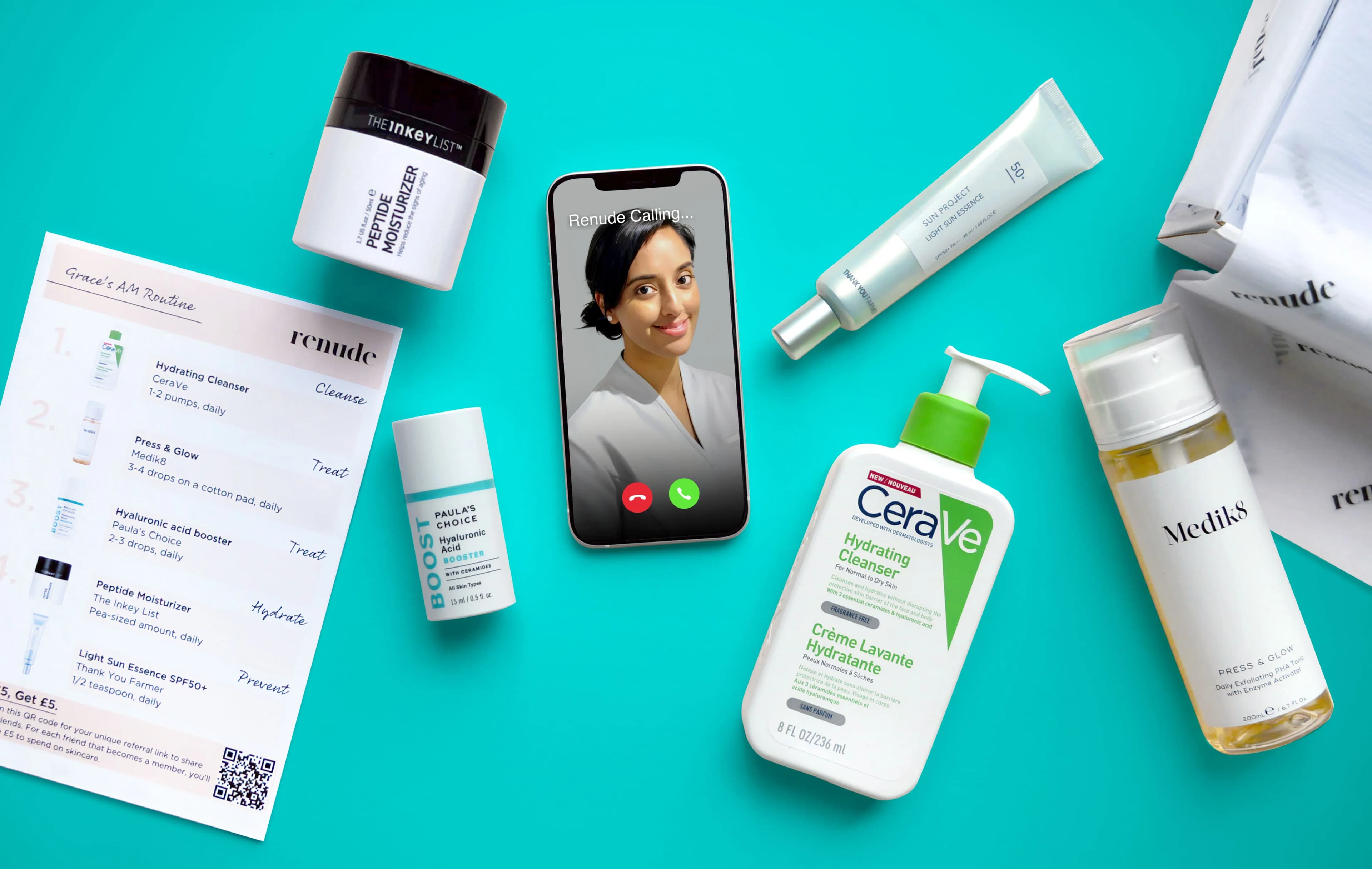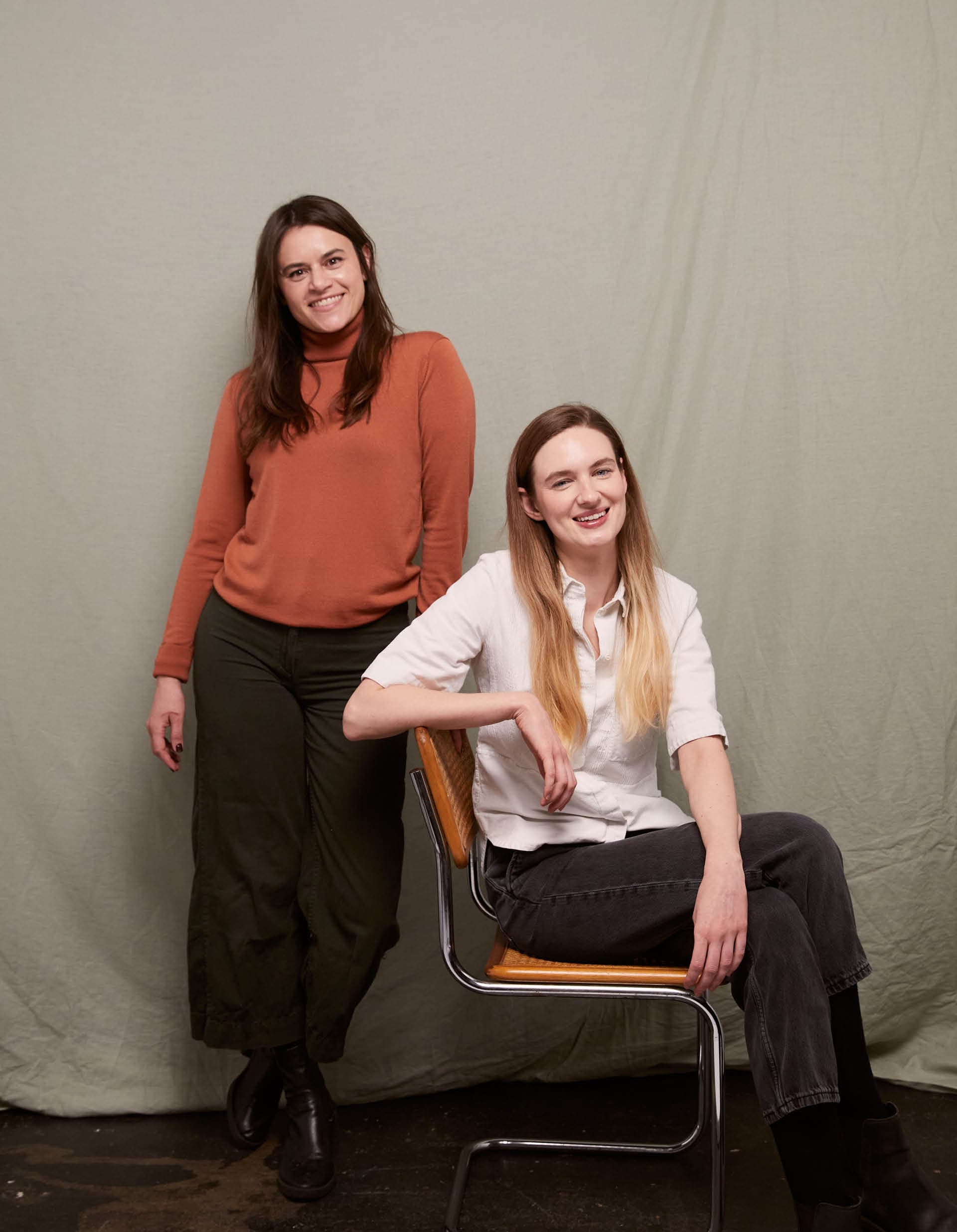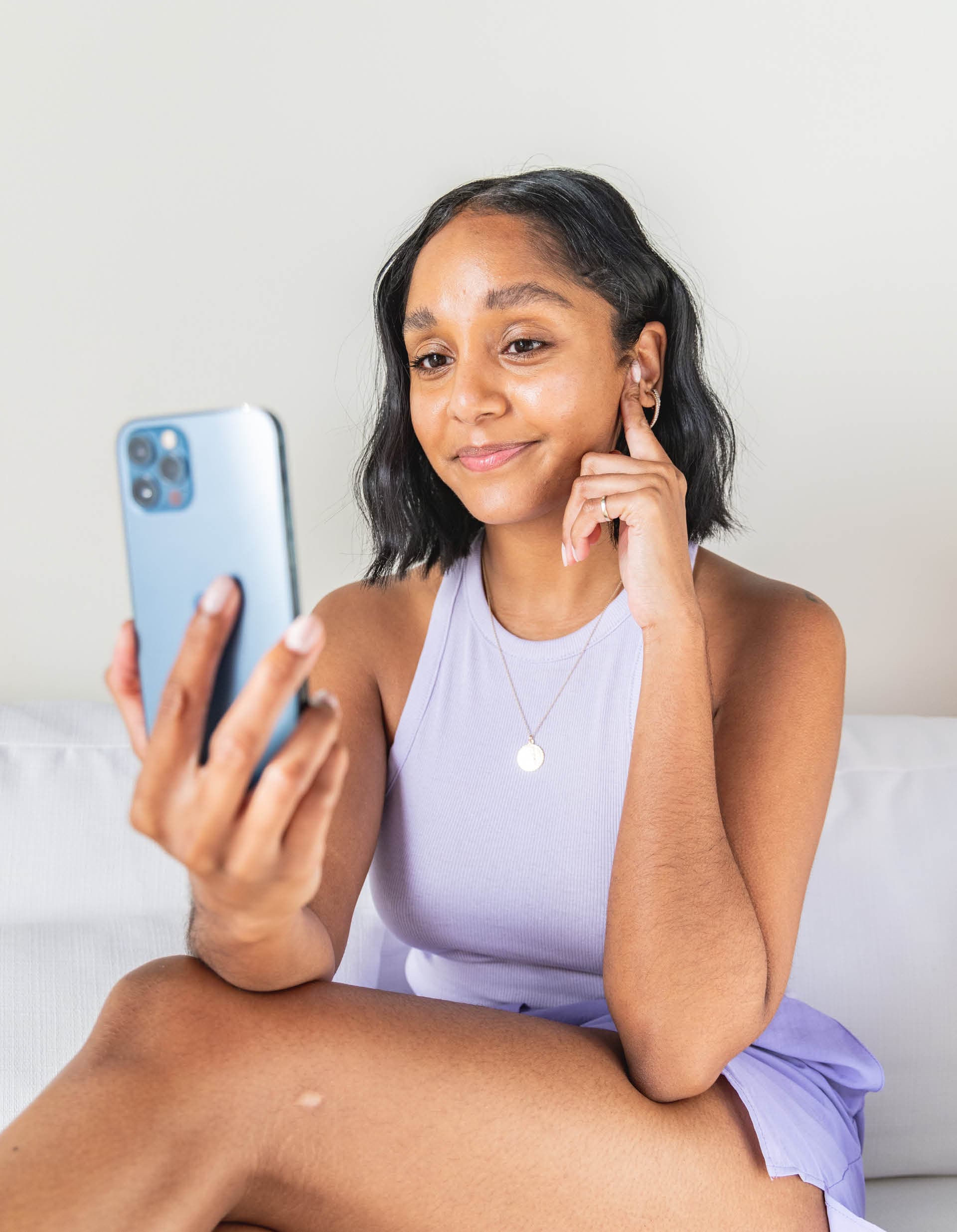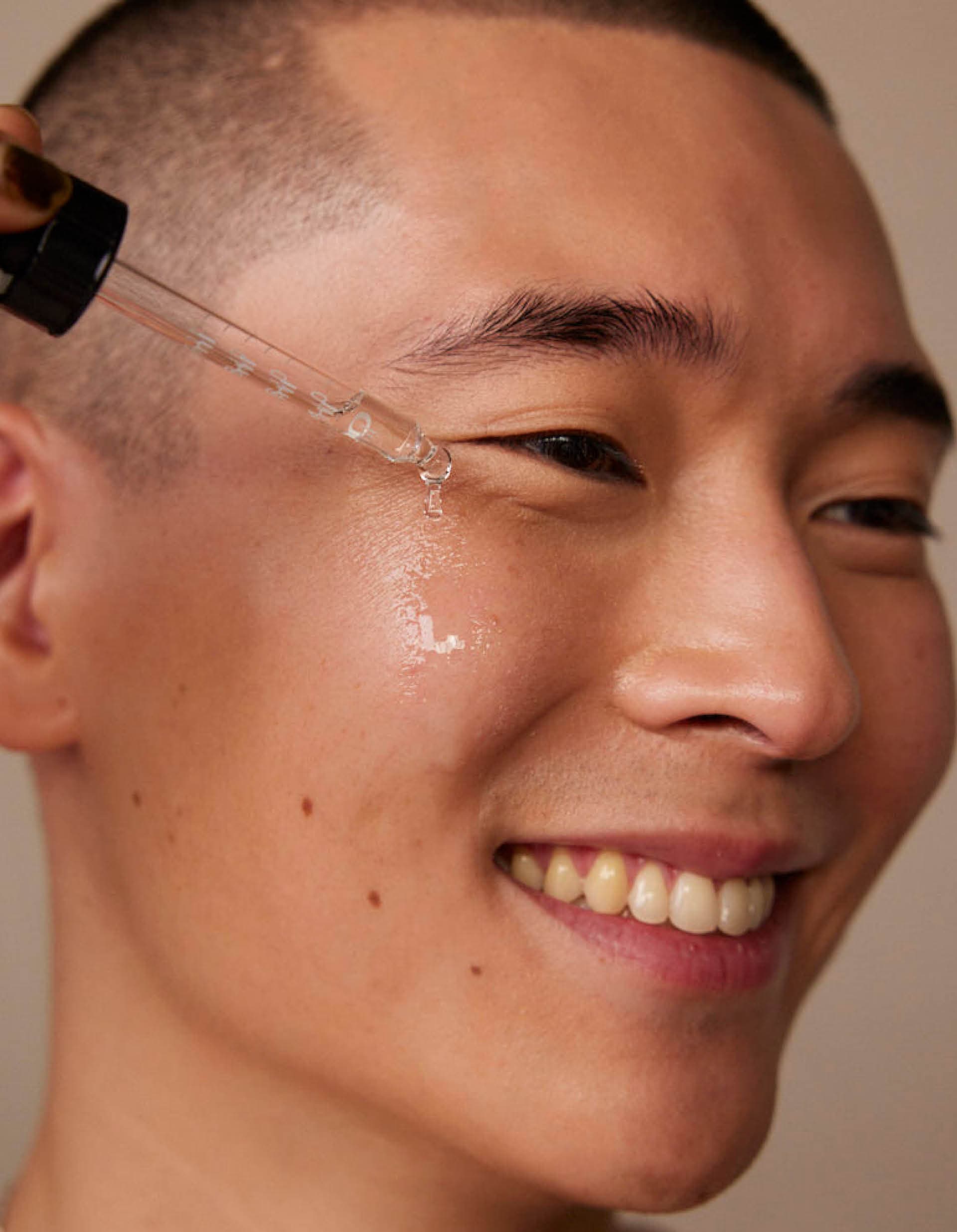We tried Renude, a skincare routine designed by AI

Deciding what products to slather on your face when you wake up in the morning and before you go to sleep each night is one most of us mull over until the end of time. We’ll ask friends, consult our favourite “skinfluencers”, and read an unholy amount of product reviews on Cult Beauty. We’ll also spend a lot of money. For myself, all of the above is true. And what really complicated matters is that since the age of 17 I’ve suffered with hormonal acne. Isolated to my chin – and often coming in the form of angry, cystic spots – it refused to budge until I made the decision to go to a private dermatologist and get Spironolactone in early 2023. The blood pressure medication that’s prescribed off-label for hormonal acne saw me go from having multiple spots at all times, to getting just one or two a month.
But Spironolactone isn’t a one stop shop. It didn’t take care of things like fine lines or dullness. And though I’d delved into the world of skincare in the past as a desperate attempt to help my acne – I’m still a bit upset about the expensive and completely unnecessary Sunday Riley oils that Caroline Hirons duped teenage me into buying – I was still relatively clueless on how the right skincare routine could help my skin be even better. Enter: Renude.
Renude is the meeting of two (skincare) minds. Pippa Harman spent a decade formulating and developing products for brands like Beauty Pie and Boots. Catherine Nisson, after noticing a friend struggling with his mental health due to cystic acne, decided that the impossible task of creating a good skincare routine was down to a data problem. When they joined forces, it birthed Renude: a platform based around formulating bespoke skincare routines using methods that brought their diverse skill sets together. Users do a quiz about their skin before uploading photos or jumping on a call with an aesthetician to discuss areas of concern. AI and the aesthetician will then analyse your photos in order to deliver you a personalised skincare routine including products which, according to Renude’s data, are the best for the job at hand. Users can then purchase the products via the platform and are able to message their aesthetician for advice as they start to use them.

And from experience, the process really is that simple. When I completed the quiz, I was impressed by not only the breadth of skincare concerns it mentioned – amongst the eighteen you can choose from, there’s everything from improving skin elasticity to getting rid of eye wrinkles – but how it asked you to prioritise them. I’m always suspicious of skincare products or initiatives that make too many promises, so this dose of honesty was appreciated. Perhaps what stuck out with the quiz most was questions around your budget for skincare products, which could be as low as £15 and under. From my travails around skincare-land, I’d also noticed this prevailing myth that you need to be using top of the line products to achieve results – La Mer, a favourite of Kim K, comes to mind – but if the popularity of brands like CeraVe say anything, it’s that this is just not the case, and I was happy to see that Renude was tapping into that. Most important of all, the quiz also covers things like your skin’s sensitivity, ingredients which you’re allergic to, and any prescription products you might be using.
My priority was blemishes and taking care of some fine lines I’d noticed. I also mentioned that I was already using Spironolactone and Treclin gel. The latter was also prescribed by my dermatologist, though I wasn’t too sure why I was putting it on my face. Not until I spoke to my Renude aesthetician Christina, anyway. My call with Christina was great. We talked about my existing skincare routine, the changes I’d noticed as a result of my Spironolactone. I felt like she was going the extra mile. To be honest, I came away feeling like I knew more about my skin and the products prescribed by my dermatologist than before. Christina told me that the fine lines I’d started to grow anxious about were likely dehydration lines that could be taken care of with a few small adjustments to my routine. And she repeatedly reiterated the importance of building a routine that would work in harmony with my prescription products.
According to Christina’s write up that came alongside my bespoke skincare routine, she’d designed one that focused on “managing breakouts” and “inflammatory spots, whiteheads and blackheads”. When used as a routine, the products would hopefully begin to “repair blemish marks”, though it might take “more than two skin cycles to see significant reductions”. My new skincare routine included Bioderma’s micellar water, CeraVe’s hydrating cleanser, Q+A Skincare’s Azelaic acid serum, iS Clinical’s moisturiser, and Thank You Farmer’s SPF.

But did these products do what Christina said? This is where my experience with Renude isn’t quite so good. To be honest, I managed to skim over where Christina said I should introduce these products slowly. I went for it, and as a result my acne-prone skin experienced a bit of a purge. That’s skincare lingo for I got a hefty breakout as a result of using all the new products. I found that the SPF pilled on the skin – a no-no for me as a frequent makeup wearer – and the moisturiser was somewhat the same. If I was having a no-makeup day I’d slather myself in these new products. If I wasn’t, I found myself going back to my old reliables. I also did get very dry around the time I started my new routine, but I’m going to chalk that to it being the dead of winter rather than anything to do with the products recommended.
It is hard to look beyond the breakout. A bunch of new spots appearing on your face will always have a palpable effect on your self esteem. That said, I did notice some positive results from my new routine. The dehydration lines I’d previously noticed on my forehead reduced, if not disappeared. When I experienced another breakout in early 2024, I also found myself going back to the Azelaic acid at night time: without a doubt, it helped to calm angry spots and make their life cycle a lot shorter. Both the Azelaic acid and the Bioderma micellar water – which felt gentler and at the same time more effective than my previous one by Garnier – will remain a part of my routine going forward. But I’ll probably return to the trusty CeraVe moisturiser and Supergoop sunscreen I was using pre-Renude.
All things said, I’d still recommend Renude to a friend. Though my skin is what some people might dub “problem skin” – which makes it hard to try out services like these without risking a huge breakout – for those with skin that’s easier to deal with, I have no doubt that the advice of Renude’s AI and aestheticians would help improve their skin. According to Renude themselves, 94% of people saw improvements in their skin in 6+ weeks after using the service. I believe that. My short chat with Christina was illuminating, her expertise positively spilling through my computer screen. Most importantly, I’m now sans the dehydration lines that were starting to give me an existential crisis about being “old”.

While the results you get from something like Renude are always going to be the crowning glory, there’s something I really admire about Renude’s ethos too. It’s mindful that not everyone has a gazillion pounds to spend on a 10-step skincare routine. When I spoke to the founders, they were aware that Renude comes at a time when the skincare world is oversaturated: “customers are overwhelmed, fed up with the complexity of finding the ideal routine” they told me. As a result, they’ve noticed “extreme over-use of ingredients, a cyclical trial and error process and a lot of unhappy skin barriers”. Essentially, Renude feels like a welcome remedy. A remedy to being duped into buying product after product that won’t necessarily work for you, and wrestling with all the subsequent anxieties that come with it: the wasted money and the clusters of fresh spots. Though Renude employs the latest technology through its use of AI, it’s “back to basics”.
It’s also hard to ignore just how cost-effective Renude is compared to going down the typical dermatologist route. I’m extremely fortunate to have bypassed all the red tape of the NHS in order to get my Spironolactone, but a lot of people won’t be able to do that. As the founders put it themselves, Renude is built around “making professional skin support accessible”. And that’s something I can always get behind.

